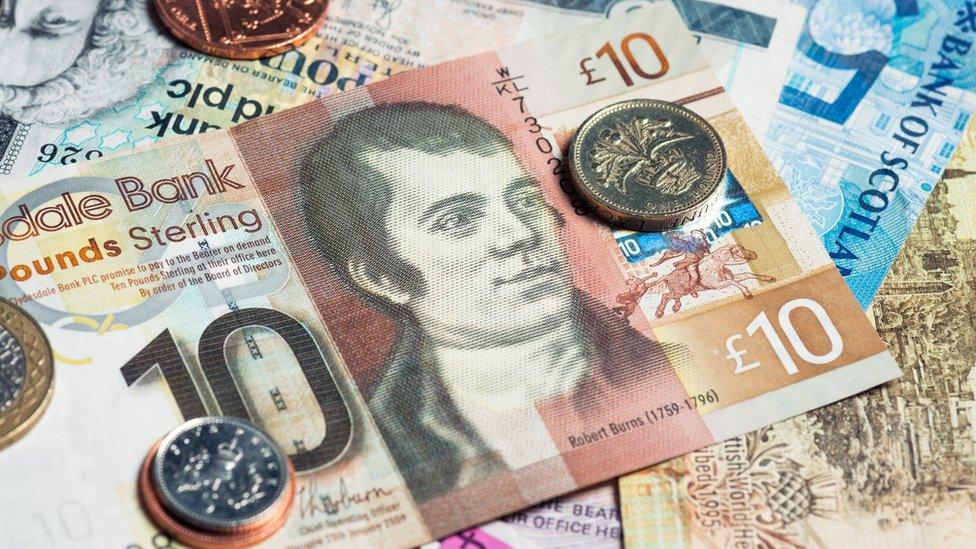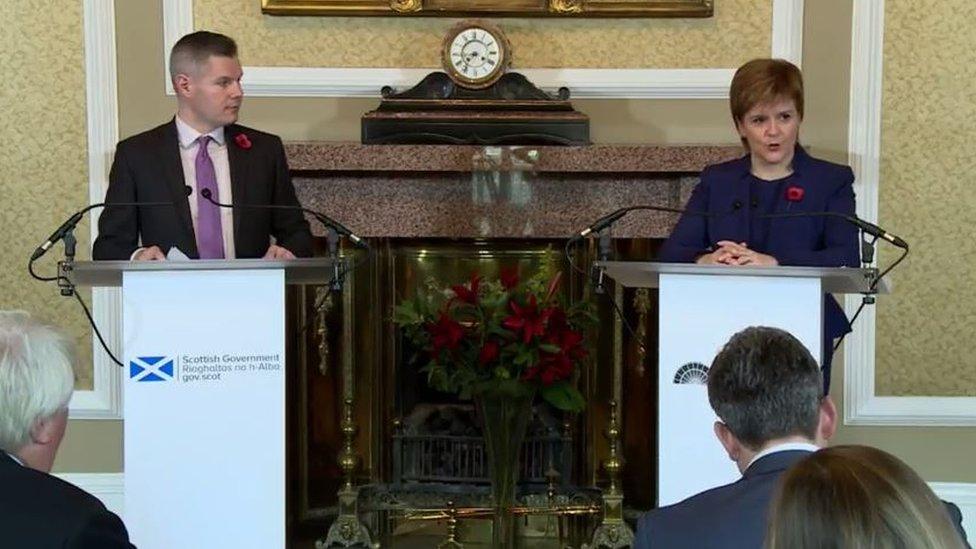Business leader warns against income tax rises
- Published

Raising income tax in Scotland could cause economic damage that will take years to fix, the head of the country's largest business organisation has said.
Scottish Chambers of Commerce president Tim Allan warned the country "cannot afford to be associated with higher taxes than elsewhere in the UK".
He was speaking at a dinner that was also addressed by Nicola Sturgeon.
She stressed that she wanted to make Scotland "the best place in the UK to do business".
It comes a week before Finance Secretary Derek Mackay reveals his budget plans to Holyrood.
Mr Mackay is widely expected to announce that he intends to use his powers over income tax rates and bands to increase taxes for higher-earning Scots in order to raise more money for public services.
He has come under pressure to do so from Labour, the Scottish Greens, Liberal Democrats and many members of the SNP - although the Scottish Conservatives have warned Mr Mackay against making Scotland the highest taxed part of the UK.
Recent research carried out by Survation on behalf of the 38 Degrees campaign group suggested that 60% of people would "personally be willing to pay more tax" if it was used to improve public services or tackle inequality - with only 15% opposed.
Mr Mackay and Ms Sturgeon set out a range of options for income tax last month, with Ms Sturgeon saying "we must consider if the time has come for those who earn the most to pay a modest amount more".
Three of the four approaches outlined in the paper would see people earning more than £24,000 pay more income tax - and all four would increase tax for those earning more than £44,290.
But in his speech to the dinner on Thursday evening, Mr Allan said raising income tax above levels elsewhere in the UK would risk long-term damage to Scotland's international investment profile.
'Level playing field'
And he warned against "careering towards tax rises in the absence of independent economic impact assessments".
Mr Allan added: "Our concern is that, at a time of sluggish growth and faltering business investment, a competitive Scotland cannot afford to be associated with higher taxes than elsewhere in the UK.
"A high-tax Scotland would be easy to achieve but the damage could take years to repair."
He went on to say: "Unless tax revenues were ring-fenced to drive growth and job creation, the cost for a small nation in terms of lost investment is incalculable.
"We want a level playing field on tax throughout the UK to keep Scotland competitive."

Analysis by Brian Taylor, BBC Scotland political editor

Derek Mackay and Nicola Sturgeon published a discussion paper on income tax last month
I think there will be an increase in taxation, that's been fairly regularly signalled.
In analysing the impact of the UK budget on the block grant for Scotland, the Fraser of Allander Institute reckoned it to be going down next year, in 2018-19, by £219m in real terms, accounting for inflation.
Derek MacKay will seek to more than match that in terms of increased taxation, so he can present it as being a growth budget.
I think it likely they go perhaps for an increase in the additional rate for those on the very highest earnings, but also an extra band for those who are above the median salary. Those who are a bit above that would end up paying a little bit more.
That's the area that really brings in the revenue, because the concern is that you can push up the top rate of 45p, and they may well do that, but there are relatively few people in that bracket and they could possibly find ways of avoiding it.
So I expect an extra band to be introduced in Scotland.

The Scottish Chambers of Commerce (SCC) represents more than 11,000 Scottish companies, which between them are said to employ more than half of the country's private sector workers.
Mr Allan, who was making his first major address as president of the organisation, also spoke of his "disappointment" that the Scottish government pledge to reduce and eliminate Air Passenger Duty in Scotland has been postponed, due to legal technicalities.
And addressing the ongoing talks between the UK and EU over Brexit, he said the priority of business was to "keep trading costs to a minimum, secure continuation of existing free trade areas and agree an acceptable transition period for business".
He added: "With the continued delay in securing an outcome, many businesses are already implementing contingency plans and we impress upon our political leaders to work with energy, focus and momentum in securing a deal which is good for business and the economy."
'First class public services'
In her own speech to the dinner, Ms Sturgeon said next week's draft budget would "set out how - at a time when our block grant for day-to-day expenditure is declining in real terms - we intend to fund first class public services, a fair social security system, and how we achieve our ambitions for Scotland's economy."
She added: "In doing that, we recognise the crucial importance of providing a good environment for all businesses here in Scotland.
"The needs of business are too often seen as separate from, or competing with, the goal of building a fairer society - the reality is that the two can be mutually supportive, and that is something our budget will seek to reinforce."
Responding to Mr Allan's speech, Scottish Conservative finance spokesman Murdo Fraser said it was "another expert view from the world of business that Nicola Sturgeon cannot afford to ignore".
He added: "Tax hikes would be a disaster not just for hard workers, but businesses right across the country."